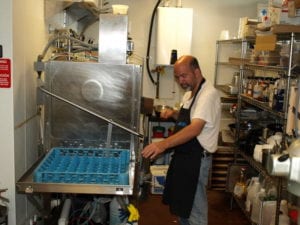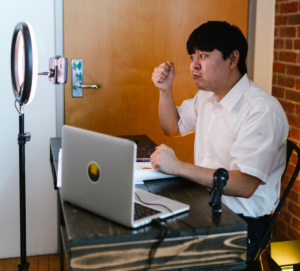Prepare yourself for a very trying time this summer if you have any travel plans. I just returned from beautiful Beaufort, SC where my wife and I stayed at a Holiday Inn. Vimal, who works for the hotel’s ownership group and is pinch-hitting as manager, does his best to greet and register new guests, between running to the kitchen with breakfast orders and helping housekeepers with locating supplies.

The hotel’s restaurant is closed for dinner and offers guests a takeout bagged breakfast in the morning. Everywhere, staff is doubling up on duties: guest registration, phone calls, bartending, restarant, and everything in between. Rooms are without the customary paper pads, pens and visitor guides. Guests need to fill out forms to receive housekeeping service. Trash receptacles are overflowing with garbage.
In an effort to gain some sense of unity, the Beaufort Area Hospitality Association posts signs at businesses asking customers to “show a little love” during this time of extremely short staffing.
The problem is too many people have the luxury of not working. The staffing shortage is especially prevalent in the restaurant and hospitality trades.
According to the South Carolina Department of Employment & Workforce, 34% of restaurant operators said they were more than 20% below normal staffing levels and 84% said they are struggling to fill positions. One manager said he gets at least five applicants a week and when he calls them, they never answer the phone.
This huge burden management has in filling jobs makes little sense when South Carolina has an unemployment rate of 5.1% and other states like California and New York have 8.5% unemployment.
Of course, it doesn’t help that the feds pumped an extra $300 a week onto the states’ unemployment claims. Why work if you can stay home and get paid more than $600 a week? Fortunately for South Carolina and several other states, this party will end June 30. But getting people into jobs that have been idle for months won’t happen overnight. The pain will continue for a while.
As a job coach working to connect folks with autism and cognitive disabilities with employers in their community, I know how important it is for people to be working. Anyone who can work should work.
So many problems arise from not working. I’ve seen young adults develop depression and lie in their beds looking up at the ceiling. Others get in trouble by hanging out with the wrong people and using drugs or alcohol. Some leave or “elope” from their residential programs and wander the streets or highways. As the saying goes, “Idleness is the devil’s workplace.”
But it’s a beautiful thing when I can connect a client with an employer. This is the case with Veronica, a woman in her 40s with Cerebral Palsy, who works as a house person at the Hampton Inn and Suites in Traveler’s Rest, SC.
“I love to work, I’m making money and making friends,” says Veronica as she takes a break from cleaning tables in the hotel’s lobby.
“There are people out there who do not want to work at the moment and then there are people like Veronica who do want to work and are capable of working,” says Chris Minor, Hampton Inn general manager.
“If there are people in the marketplace who aren’t looking for jobs, I think it’s very important that we find the people who are and let’s touch their lives and let them touch ours,” says Minor. “Veronica smiles a lot and when staff and our customers see that, it’s infectious. It lifts all of us up and we say ‘Hey if she can do it, we can do it.’”
Perhaps the Beaufort Area Hospitality Association can start a campaign promoting the hiring of people with disabilities who truly want to work to fill the staffing needs of its restaurants and hotels. Their smiles will go a long ways in lifting the spirts of customers. And that’s something all of us could use these days!



